#Allen v. Milligan
Text
youtube
Haven't heard anything abt this on here so I thought I'd throw it up. It explains the US Supreme Court's surprise ruling on a case in which Alabama voters sued the state for racial discrimination in their gerrymandering... and, shockingly, won. In a 5-4 decision, two of the conservative justices (John Roberts and Brett Kavanaugh--no I don't get it either) voted with the 3 liberal justices to preserve the Voting Rights Act.
It's not a perfect decision and it's a group of justices that could break down in the future, but it was a shocker for me, and some good news for once, especially considering I used to live in the district in question!
7 notes
·
View notes
Text

[The Daily Don]
* * * * *
An indictment to preserve the rule of law.
June 9, 2023
ROBERT B. HUBBELL
A Miami federal grand jury issued an indictment against former president Donald Trump on June 8, 2023. According to early reporting, the indictment includes seven counts, including willful retention of national defense documents, making false statements, conspiracy, and obstruction of justice (possibly for witness tampering). Trump claims he will appear in federal court in Miami next Tuesday to enter a plea.
Indicting Trump is the right result. Indeed, it was necessary to protect the rule of law and preserve the Constitution. Trump is entitled to the presumption of innocence (in court) and a fair trial, but the publicly known facts strongly suggest that Trump is guilty. Failing to indict Trump would have undermined public trust in fairness, justice, and equality under the law in the US.
The indictment of Trump is no cause for celebration, but it is cause for relief and gratification that the organs of justice in the United States are up to the task of holding a former president to account. As Larry Tribe and Dennis Aftergut wrote in The Bulwark, “The long-anticipated charging of the former president shows a Justice Department worthy of its name.”
It was not a foregone conclusion that special counsel Jack Smith would seek an indictment or that a grand jury would issue one despite substantial evidence to support probable cause. Others before Jack Smith walked to the precipice of holding Trump to account and blinked. Smith did not. And Merrick Garland did not exercise his right to overrule Smith’s decision to seek an indictment. For that, we should be grateful.
It is sobering and disappointing to know that a former president of the United States would stoop to obstruction of justice, lies, conspiracy, and unlawful retention of defense secrets because he believed (wrongly) that he was above the law. Trump is not the first president to abuse his power or break the law, but Trump’s indictment will dissuade future presidents tempted to do so. That is the point. If we do not enforce the law when the facts demand it, the law is a mockery.
The June 8th indictment should also provide all Americans with hope that Trump will be indicted for his attempted coup and incitement of the insurrection on January 6th. Though the charges regarding retention of defense secrets are serious, those charges are subject to confusion and false equivalency because Vice President Pence and President Biden both inadvertently retained classified documents when they completed their respective terms as vice president. Although those cases are easily distinguishable, nuance is not a strong suit of viewers of Fox News (an insight that is critical to Fox’s success).
Prosecuting Trump will be an ordeal for the nation. So be it. The only thing worse for the nation than prosecuting Trump is not prosecuting Trump. Failing to prosecute Trump would be a dereliction of duty from which the nation would not recover. So, as we endure Trump's effort to turn his prosecution into a spectacle that is equal parts circus and cage match, we should be confident that the ordeal is worth the effort. America is bigger than Trump and will abide long after Trump becomes the American icon for corruption.
We will hear dozens of times over the next year that Trump is “entitled to a presumption of innocence.” That is a true statement but applies to the jury that weighs the evidence of his guilt. See Manual of Model Jury Instructions, 1.2 The Charge—Presumption of Innocence | Model Jury Instructions. But we are not jurors and are entitled to form opinions based on facts known to the public. The issuance of the indictment does not strip us of our First Amendment Rights or our ability to make reasoned judgments. The evidence strongly suggests that Donald Trump is guilty of unlawful retention of national defense documents—a felony for which others in his position have been sentenced to three years in prison.
Jack Smith’s selection of Miami as the venue for Trump's trial suggests that Smith’s objective is to obtain a conviction that will be upheld on appeal and result in a prison sentence for Trump. The details regarding the selection of Miami as a venue are complicated and not worth explication at this point. Smith has made his choice of venue, a choice that signals his intent to obtain a conviction that will stick.
An underreported detail is that five sealed cases were filed in Miami federal court within minutes of one another on Thursday. See Anna Bower on Twitter (attaching a copy of the PACER listing for Southern District of Florida). One sealed case is presumably against Trump; it is reasonable to infer that the other four sealed cases are against Trump's co-conspirators. If true, the filing of five cases by Jack Smith suggests that he is serious about prosecuting everyone who violated the law.
After I reviewed the above paragraphs with my Managing Editor/wife, she said, “That’s fine, but you haven’t told your readers how you feel about the indictment.” Since my Managing Editor’s advice is unerring, here is how I feel about the indictment:
For the last four years, I have felt frustrated, upset to the point of anger, and incredulous that Trump has managed to escape accountability despite his public, manifest corruption. Those feelings have been exacerbated by the gleeful, bad-faith defense of Trump by his GOP minions who were more interested in “owning the libs” than in “protecting the Constitution.” It was revolting. Indeed, there is a universal human revulsion to being placed in an unfair situation where everyone knows the situation is unfair but there is no remedy to the unfairness. That is how I have felt over the last four years—a feeling shared by tens of millions of Americans.
Tonight, I feel a sense of relief and vindication. I want Trump to be held accountable after a fair trial. He deserves to be convicted. He deserves to be sent to prison. Indeed, if he were anyone other than a former president, he would already be in prison (or in jail as he awaits his trial date without benefit of bail). I am disgusted that the media has already turned to the question of “What are the political implications of the indictment?” To be sure, that is a serious question worthy of discussion. But the fact that a former president has been indicted under the Espionage Act is more than a set up for speculation about 2024.
I am gratified that the tide has turned against Trump. He will be indicted in Georgia for election interference. He will stand trial in Manhattan in March 2024. And the odds are that he will be indicted for attempting a coup and inciting an insurrection. He deserves all that and more. And he will continually incriminate himself—as he did during the CNN townhall and his post on Truth Social on Thursday evening. The knowledge that every word he utters makes his conviction more certain will make the next two years more bearable.
But my overwhelming feeling on Thursday night is that the center has held—as I believed it would. My faith in the Constitution and the rule of law has been rewarded. None of this means that I will let down my guard or assume victory. But a win every once in a while, especially on important matters, can renew our faith and reinvigorate our will to win.
That’s how I feel tonight. Speaking of “securing a win every once in a while,” read on!
Supreme Court rules that Alabama racial gerrymandering violated Section 2 of Voting Rights Acts.
In a surprise to Court watchers, the US Supreme Court ruled 5-4 that racial gerrymandering by the Alabama legislature violated Section 2 of the 1965 Voting Rights Act. John Roberts and Brett Kavanaugh joined the Court’s three liberal justices to preserve the last remaining section of the Act that was gutted by John Roberts in Shelby County v. Holder.
For a detailed discussion of the holding, see Mark Joseph Stern in Slate, John Roberts and Brett Kavanaugh saved the Voting Rights Act. Per Stern,
The Supreme Court’s 5–4 decision in Allen v. Milligan on Thursday, which found that Alabama’s congressional map violates the Voting Rights Act’s ban on racial vote dilution, sends two clear messages. First, a bare majority of the court—Chief Justice John Roberts, Justice Brett Kavanaugh, and the three liberals—believes that the VRA still plays a meaningful role in maintaining a multiracial democracy (or is willing to defer to Congress’ judgment on the matter). Second, that same majority of the court does not look kindly upon red states’ race to shred decades of precedent in an effort to wipe out the voting power of Black Americans.
The good news is that the decision means that Alabama must create a second congressional district in which the voting power of Black voters is not diluted by gerrymandering. It is likely that Alabama will add a second Black Democratic representative to its congressional delegation.
The even better news is that the holding in Allen v. Milligan will likely boost the prospects for plaintiffs in cases across the nation challenging racial gerrymandering by GOP legislatures. See Democracy Docket, How the U.S. Supreme Court’s Decision in Allen v. Milligan Will Impact Ongoing Redistricting Litigation. It is possible the effect of the ruling in Allen v. Milligan is a net gain of six Democratic seats in the House in 2024.
Why did John Roberts and Brett Kavanaugh switch sides to join with the liberal justices? One theory (with which I agree), is that Roberts and Kavanaugh understand that their ruling in Dobbs has inflicted a grievous wound on the Court’s legitimacy and they are attempting to limit the damage. Whatever the reason, the ruling is a major victory for advocates for voting rights. As I said above, a win every once in a while, especially on important matters, can renew our faith and reinvigorate our will to win. We should all feel good tonight!
#The Daily Don#J.Ouquette#TFG#Robert B. Hubbell#Robert B. Hubbell Newsletter#GOP Legislatures#Allen v. Milligan#redistricting
5 notes
·
View notes
Text
Charting the Justices Decisions Cutting Across Ideological Lines
Supreme Court decisions come down to coalitions and are often predicated on the question of whether a justice can garner at least four additional other votes to support their position in a case. Sometimes these coalitions are easy to come by. The Court decides somewhere around 33% or more of its cases on average per term by unanimous 9-0 votes. The number of unanimous votes diminishes though as…

View On WordPress
#Allen v. Milligan#Dobbs v. Jackson Women&039;s Health#Goldman Sachs v. AK Teachers Retirement System#Gundy v. United States#Ideology#Mallory v. Norfolk#National Pork Producers Council v. Ross#Roe v. Wade#Rucho v. Common Cause#Sackett v. EPA#Supreme Court
0 notes
Text
Oh you better believe 2024 is game fucking on now.
#lawblr#the real lawblr#scotus#voting#voting rights#Allen v Milligan#elections#2024 elections#gerrymandering
35 notes
·
View notes
Text
SCOTUS surprisingly didn’t gut the VRA! (Gift link)
2 notes
·
View notes
Photo

𝗕𝗥𝗘𝗔𝗞𝗜𝗡𝗚 🚨 Today the Supreme Court allowed the Louisiana congressional map to be redrawn to add another majority-Black district.
This decision a win for our democracy and Black voters in Louisiana, who were facing a congressional map that diluted their power and forced them into one district.
Today's ruling comes on the heels of Allen v. Milligan, in which SCOTUS upheld Section 2 of the Voting Rights Act and ordered Alabama officials to redraw the state's congressional map to allow an additional Black majority district.
170 notes
·
View notes
Text
Last June, Supreme Court Justices John Roberts and Brett Kavanaugh shocked observers by joining the court’s three liberal justices to reject an Alabama congressional map aimed at diluting Black voters’ power. The ruling marked a (likely temporary) hiatus in the Roberts court’s systematic dismantling of the Voting Rights Act. It also invited a bevy of columnists to opine, See, this court isn’t so bad after all!
On the one hand, some fanfare was warranted. The Allen v. Milligan opinion was a genuine surprise, and as a recent lower court ruling in Georgia demonstrates, its effects will reverberate throughout the 2024 election cycle and beyond. A bad ruling would have been disastrous.
On the other hand, focusing on the decision obscures a disturbing reality: In the decade since it decimated the VRA with its notorious Shelby County v. Holder decision, the court’s right-wing majority has used its docket-setting power to tilt the playing field so sharply against democracy that even the rare “wins” simply preserve a degraded status quo.
A new study published on Thursday and led by my colleague Chelsey Davidson found that since the 2012–13 term, more than 80 percent of election-related cases on the Supreme Court’s hand-picked docket could move the law only in a direction that degraded fair elections.
In that time, the Supreme Court accepted 32 cases involving core democracy issues such as redistricting, ballot access, campaign finance, and VRA enforcement. In 26 of them, the lower court had issued a pro-democracy ruling. This means that the best-case scenario at the court was affirmation of the status quo, while a reversal of the lower court would restrict voter participation. By contrast, the justices picked just six cases where they might reverse anti-democracy rulings.
It’s not quite “Heads I win, tails democracy loses,” but it’s pretty damn close.
84 notes
·
View notes
Note
Looking on from abroad, I don't like any of the recent rulings by SCOTUS ideologically, but they're also clearly correct. The constitution is not in line with liberal or leftwing values. Like I'm not saying "thus these values should not be pursued", but the court's role is to say what the constitution says; and the constitution says "fuck the poor" etc.
They're not though. Before getting into it you need to be aware that there are proper and improper procedures for how these things are done. It makes sense, because otherwise the Supreme Court could pro-actively dictate what the law is and isn't, as you understand.
There have to be cases brought to them, there need to be parties to that case, etc. Does this make sense?
With that said, a brief line about why the recent rulings are actually incorrect.
Dobbs v Jackson (Overturning Roe v Wade) - Arguably the most defensible ruling, it still flies in the face on 50 years of legal precedent, the rulings stand in exact opposition to sworn testimony of many of the judges, and it's still wildly ideologically driven. They were put on that bench to overrule Roe and they took the opportunity to do so.
Biden v Nebraska (No student debt relief) - The Heroes act, which was the law at question, gave the secretary of education the ability to modify or waive parts of the law. The majority opinion is very much a "you're right by what the law says, but it looks wrong to us." They rooted a lot of their ruling on "There's no way that Congress wanted this" despite the heroes act explicitly being for the relief of educational debt during times of national crisis.
Stewart (Gay Web Design) - There is no case. On top of the fact that this is explicitly counter to the entirety of existing civil rights law, precedent, and theory, the web designer was never asked to make a gay wedding website. It was a god damn sham from the word go. It was rooted in a theoretical "wouldn't it be fucked up if I had to do a thing?" It also gives the framework and arguments, in the Justices own god-damnable words, to overturn the Civil Rights Act, Gay Marriage laws, and even a whole host of anti-espionage laws. I actually would like some of those to be overturned, but I'm including them here to emphasize how idiotic, short-sighted, and bullshit the ruling was.
SFA vs Harvard (Affirmative Action) - Also flies in the face of decades of precedent and laws, but more importantly it flies in the face of this own court's other rulings. You may have heard about Allen v Milligan, where the Supreme Court threw out an Alabama congressional map for being really, really racist. That's correct: the map was, but the support for throwing it out was the same argument for the dissent in this case. State bodies can use racial makeup and information in efforts to eliminate racist institutions.
You can make judgments based on race if you're getting rid of racism, basically. Which is what Affirmative Action is intended to do. People can argue that it might need to be more fluid, less restrictive, or reconfigured frequently, sure. But that is a legitimate pursuit and application of governmental power.
There are more problems, and more cases, but there's a reason why law schools and firms all over the country are collectively giving side-eye and shit-talk to this Court.
#law#the supreme court#original content#affirmative action#lgbtq#student debt relief#joe biden#politics#roe v wade#abortion
64 notes
·
View notes
Text
Why Did The Law Constrain Them Now?
Way back when, I spotted a great parodic bumper sticker during the 2008 presidential campaign. It read: "Bush/Cheney '08: Why Should The Law Stop Us Now?"
Yesterday in Allen v. Milligan, the Supreme Court defied expectations and, in a 5-4 ruling, preserved some semblance of a Voting Rights Act by striking down Alabama's congressional maps as illegally racially gerrymandered. Chief Justice Roberts and Justice Kavanaugh "crossed the aisle", so to speak, and now everyone is trying to figure out why (for Roberts in particular, whose hostility to voting rights long predates his time on the Court).
It is a sign of our cynical era that virtually nobody thinks the answer is "because they felt this was the right legal answer." This is especially striking because, when a justice does vote against their presumed ideological proclivities, that would seemingly spawn a greater inference that they genuinely believed in their position's formal legal correctness. If they faced the happy coincidence of "the law supports the defendant" and "I, personally, support the defendant", why wouldn't they raise a glass to their good fortune and vote accordingly?
But on the constitutional law listserv I'm a member of, everybody seems to think that this is some political legitimacy play. The conservative members cannot fathom that their preferred outcome is not legally correct; they think that Roberts and Kavanaugh voted in some ill-conceived attempt to "store political capital" and stave off allegations that the Court has become a six-member right-wing wrecking ball. Needless to say, they hold such a practice with nothing but contempt; they think Roberts and Kavanaugh are squishes. The liberals in the group, of course, do think the outcome is legally correct, but they too seem to think it's fanciful that something as trifling as "the law compels it" motivated Roberts' and Kavanaugh's votes. After all, they might ask, after years of taking a flamethrower to settled judicial doctrine and longstanding precedents in service of a hard-right agenda, why should the law have constrained them now? They also don't give much, if any, credit to the justices for any "legitimacy" chits they might have thought they earned.
It is hard for me not to credit the cynicism here. But if I were to craft a non-, or at least less-, political explanation for Roberts' and Kavanaugh's votes, it would be to distinguish between the millenarian and Burkena conservative impulses seen on the Court.
The former is the pull of reactionary revolution -- you see the promised land, and are ready to chop down anything in your path that poses a barrier to reaching it. In this mode, the Court's conservatives will burn down precedent, torch settled expectations, and tank the Court's political legitimacy in pursuit of a vision of idealized legal conservatism that they insist is right and true. "The heavens may fall that justice be done." Millenarianism is the impulse that yielded Dobbs, Bruen, and Kennedy, the new "major questions" doctrine and the possible overturning of Chevron, the prospective end to affirmative action and the stunning plausibility of adopting the Independent State Legislature doctrine. Radical alterations of law with unknown and unknowable consequences, in deference to abstract right-wing legal theory and/or concrete right-wing political results. Thomas, Alito, Barrett, and Gorsuch all seem to be in thrall with the millenarian vision, albeit with perhaps slightly different visions of what utopia should look like.
The Burkean mode, by contrast, is the mode of caution, prudence, and restraint. It shies from radical change, it is cognizant of the many things it doesn't know. Recognizing the complexity of the legal machine it oversees, the Burkean conservatives are reluctant to fiddle with the dials too readily. They're willing to trim and cut, but look skeptically upon sweeping change. This impulse, at least, is found in Roberts' Dobbs concurrence, the mifepristone stay, and the so-far unwillingness to endorse any of the yearly crackpot attempts to kneecap the Affordable Care Act. It is not about liberal outcomes (as my placing Roberts' Dobbs opinion in the category should make clear); in other times, Burkeanism might operate as a voice of restraint against sweeping progressive legal victories (recall Roberts' Obergefell opinion). But on this Court, the realistic choices are between radical right-wing change and upholding the status quo -- it's hard to think of a single example of a Court ruling since Barrett's ascension that actually represents change (radical or otherwise) in a progressive direction (the liberal "victories" have generally taken the form of "managing to hold the line against a conservative assault").
On the current Court, Roberts and Kavanaugh have been most susceptible amongst the conservatives to the Burkean impulse, albeit typically in no more than halting fashion. But it's more than just naked political appeasement or trying to impress the libs (neither justice, I think it is fair to say, has shown either much interest or much success in garnering even begrudging liberal admiration). Burkeanism is a branch of conservatism too, and it shouldn't surprise that within the conservative coalition there would be those who find it comparatively more appealing. Some conservatives look at the messianic fervor that has gripped their compatriots and get antsy. They certainly feel the temptation. But ultimately, they are not quite so keen to smash the machine; they are not quite so confident they understand the fallout. And so, periodically, they step back from the abyss, and restrain themselves. Perhaps that's what happened here.
via The Debate Link https://ift.tt/2dey7Kq
53 notes
·
View notes
Text
the material result of Allen v Milligan is basically whether Alabama has one black-majority congressional district or two; given the inadequacies of FPTP and the limits of district design as a solution to inequalities in political representation under current law, i don’t think headlines of the form “CLARENCE THOMAS ARGUES WE SHOULD LITERALLY SET FIRE TO BLACK VOTERS IN ALABAMA” are really accurate or helpful. but it is a nice surprise to see SCOTUS defending the VRA and encourage more balanced representation in congress at least a little bit
23 notes
·
View notes
Text
A federal court struck down Alabama’s congressional map on Tuesday, after GOP state lawmakers refused the court’s mandate to draw a second majority-Black district.
The three-judge panel wrote that it was “deeply troubled” that the state legislature declined to draw two majority-Black districts. The same court ruled last year that it should draw a second majority-Black district to comply with the Voting Rights Act. The Supreme Court affirmed the ruling from the lower court earlier this year.
An independent court-appointed expert will now draw Alabama’s congressional map for the 2024 election. Republicans in the state are expected to appeal the decision, which could eventually make its way to the Supreme Court again.
“This is a significant step toward equal representation for Black Alabamians,” said Eric Holder, the former Democratic attorney general who now helms the party’s main redistricting organization, which backed the lawsuit. Holder added that the court rejected “the state’s blatant attempt to diminish those rights in defiance of both this court and the Supreme Court of the United States.”
Drawing a second-majority Black district in the state would likely lead to a second Democrat being elected. Currently, the state has a 6-1 delegation, with the only Democrat — Rep. Terri Sewell — coming from the state’s only current majority-Black district.
The cases in Alabama — Milligan v. Allen and other consolidated lawsuits — were backed by civil rights organizations and Democratic Party-aligned groups. They charged that the original map Republicans drew after the 2020 census, which had only one majority-Black district, violated the Voting Rights Act by diluting the power of Black voters. The three-judge panel agreed, writing in its decision last year that only two majority-Black districts or “something quite close to it” would fix it.
Earlier this year, the Supreme Court affirmed the lower court’s findings that the old Alabama map likely violated the Voting Rights Act. The ruling was a surprise for many court watchers, who had anticipated that the nation’s top court would use the case as an opportunity to chip away at the landmark piece of legislation that the Roberts court has repeatedly targeted.
Republicans in Alabama effectively thumbed their noses at the courts when given the opportunity to redraw the lines. The GOP-dominated legislature ultimately drew a new map that once again had just one majority-Black district and one with a Black voting age population of just under 40 percent. Alabama Republicans argued that they were complying with the law, saying the challengers did not prove the new maps violated the Voting Rights Act and that they were not compelled to draw a second majority-Black district to remedy any violation.
During oral arguments and in court filings, Alabama Republicans signaled that they would likely appeal any decision tossing out the lines.
The three-judge panel — Circuit Judge Stanley Marcus, who has been appointed to posts on the federal bench by both President Ronald Reagan and Bill Clinton, and District Judges Anna Manasco and Terry Moorer, both appointees of President Donald Trump — rejected those arguments.
“The law requires the creation of an additional district that affords Black Alabamians, like everyone else, a fair and reasonable opportunity to elect candidates of their choice,” the judges ruled Tuesday. “[The new map] plainly fails to do so.”
They also said they did not need to give the legislature another chance to redraw the map, saying there is no need to provide “a second bite at the apple” after state lawmakers made no effort to comply with the Voting Rights Act.
The Alabama litigation is just one of several ongoing redistricting lawsuits in the South that could ultimately lead to more Black and Latino representation — and more Democratic seats — in Congress.
On Tuesday, hearings kicked off in a lawsuit in Georgia that similarly alleged that the congressional map prevents Black voters from having the opportunity to elect candidates of their choosing. Hearings in a Louisiana suit are also set to resume next month. And a state judge in Florida ruled over the weekend that the state’s congressional map weakened the power of Black voters and must be redrawn, a ruling that is expected to be appealed by Republicans.
All told, as many as 13 states could see new lines before the 2024 election.
14 notes
·
View notes
Text
Passing the Oral Argument Torch
What seemed like an innocuous comment during oral arguments on October 3rd, 1994 by Richard Seamon, attorney for the Department of Justice in the case of United States v. Shabani led to lengthy retort. Seamon, prepared to end the arguments stated, “Unless the Court has further questions, I have nothing further.” Justice Breyer in his first oral argument had yet to speak at the 42-minute marker…

View On WordPress
#Allen v. Milligan#Justice Breyer#Justice Jackson#Republic of Sudan v. Harrison#Torres v. Texas Department of Public Safety#U.S. v. Shabani
0 notes
Text
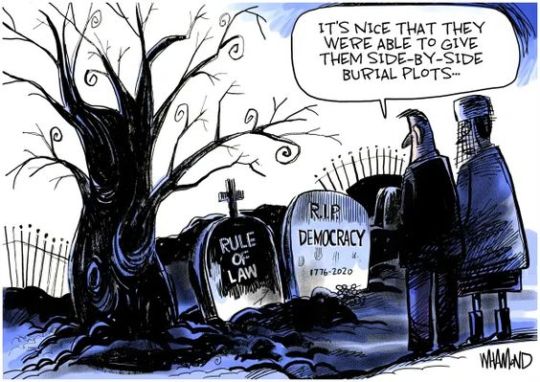
“Contumacy” is an archaic word used mainly in legal settings. It is defined as the “stubborn refusal to obey or comply with authority, especially a court order.” There are few occasions when “contumacious” is the appropriate adjective to describe an actor’s conduct, but it perfectly describes the conduct of both the Alabama legislature and defendant Donald Trump.
As explained below, the Alabama legislature and Donald Trump have flouted the rule of law by “stubbornly refusing to obey” orders issued by federal judges, for which they should be rebuked and punished. But there is an uncomfortable truth (for them) lurking beneath their contumacious conduct: They are frightened. They see the day of reckoning approaching—which they fear more than the wrath of angry judges armed with judicial sanctions.
In their respective efforts to suppress equal voting rights for Black Americans and avoid a lengthy prison sentence, the Alabama legislature and Trump have concluded that their best path forward is to flat-out disobey the law—damn the consequences! That is contumacy: raw, unbounded disobedience to the laws that are the foundation of civil society. Contumacy has become the business model for the GOP as it fights a rear-guard action to hang onto power it can longer legitimately claim in a representative democracy. It is a sign of weakness and desperation for the GOP. And, counter-intuitively, it is a sign of hope for Democrats that the day of reckoning for the minority ruling party is fast approaching. Let’s take a closer look.
Alabama redistricting proposal is (again) declared illegal.
In 2022, the US Supreme Court upheld a lower court ruling that the Alabama congressional districts violated Section 2 of the Voting Rights Act. The Court agreed that the Alabama districts were the product of racial gerrymandering designed to deprive Black voters in Alabama of a second “opportunity” district “in which Black voters either comprise a voting-age majority or something quite close to it.” See the US Supreme Court’s opinion in Allen v. Milligan (10/04/22). The Court ordered the Alabama legislature to redraw the congressional district maps in a way that created a second opportunity district.
The Alabama legislature drew new maps that again failed to create a second opportunity district as ordered by the Supreme Court. Voting rights advocates filed another suit against the Alabama legislature. On Tuesday, a three-judge panel rebuked the Alabama legislature for its contumacy and ordered a special master to create congressional districts that complied with the Supreme Court’s ruling in Allen v. Milligan. The district court’s order is here: Singleton v Allen | Injunction, Opinion, and Order.
The three-judge panel was unsparing in its criticism of the Alabama legislature’s contumacy:
We have now said twice that this Voting Rights Act case is not close. And we are deeply troubled that the State enacted a map that the State readily admits does not provide the remedy we said federal law requires.
We are disturbed by the evidence that the State delayed remedial proceedings but ultimately did not even nurture the ambition to provide the required remedy. And we are struck by the extraordinary circumstance we face.
We are not aware of any other case in which a state legislature — faced with a federal court order declaring that its electoral plan unlawfully dilutes minority votes and requiring a plan that provides an additional opportunity district — responded with a plan that the state concedes does not provide that district.
As explained by Mark Joseph Stern in Slate, the Court also criticized Alabama for attempting to create a situation in which its serial contumacy will be rewarded by the permanent denial of a second opportunity district for Black voters. See Mark Joseph Stern in Slate, Alabama is learning the dangers of defying the Supreme Court.
As explained by Stern:
Alabama Republicans, however, treated the Supreme Court’s ruling as a mere suggestion. After a pointless delay, the Legislature enacted a map that contained the same flaws as the old one. . . . Alabama’s chief argument at this stage is that every time the Legislature redraws a map, courts must throw out their prior analysis and restart the case afresh.
Moreover, according to the state, courts must permit elections under the challenged plan while mulling each redrawn map. And if a court strikes down a new map, it must put its ruling on hold for any upcoming races. It must also wait for the Legislature to draw a substitute map before imposing its own, even if the Legislature drags its feet in a bid to run out the clock to the next election.
The court found this position not just unpersuasive, but unconstitutional. . . . Alabama seeks to create “an endless paradox that only it can break, thereby depriving plaintiffs of the ability to effectively challenge and the courts of the ability to remedy.” States cannot transform voting rights litigation into an “infinity loop” that only they may stop.
Alabama plans to appeal the ruling of the three-judge panel directly to the Supreme Court. Let’s hope that the Supreme Court summarily rejects Alabama’s petition for review. Otherwise, the Court will be rewarding Alabama’s bad-faith refusal to abide by a lawful order of the US Supreme Court issued last October.
[Robert B. Hubbell Newsletter]
+
Wisconsin Republicans seek to nullify election
September 7, 2023
ROBERT B. HUBBELL
As I noted yesterday, the reactionary efforts of the Alabama legislature to disobey an order from the Supreme Court betray fear and desperation. The Alabama GOP can see the day when its death grip on minority rule will end. So, too, with Wisconsin Republicans, who are considering nullifying the recent election of Justice Janet Protasiewicz to the Wisconsin Supreme Court by an 11-point margin. Republicans in the Wisconsin Assembly are planning to impeach Justice Protasiewicz and then allow her trial on the impeachment charges to languish forever in the Republican-controlled Wisconsin Senate.
Why?
Answer: Because impeachment by the assembly automatically suspends Justice Protasiewicz pending her trial in the Senate. (The Wisconsin Constitution provides, “No judicial officer shall exercise his office, after he shall have been impeached, until his acquittal.”) If a trial after impeachment never occurs, Justice Protasiewicz is permanently suspended based on the unilateral action of Republicans in the Wisconsin Assembly. That perverse abuse of the state’s constitution will nullify the votes of 1,021,822 Wisconsinites. See CNN, Wisconsin GOP weighs moves to sideline elections chief and liberal Supreme Court majority.
On what grounds will Justice Protasiewicz be impeached? Like the threatened impeachment of President Biden, the grounds for impeachment are pesky details to be supplied later. The impeachment effort is gaining steam even though Justice Protasiewicz has yet to rule on a single case. But the court’s docket includes two lawsuits that challenge the nation’s most egregious partisan gerrymandering that has given Wisconsin Republicans a permanent, corrupt stranglehold on the state legislature.
Justice Protasiewicz rightly campaigned on a pledge to “restore democracy” and reproductive freedom to Wisconsin—pledges that sent Wisconsin Republicans into a testosterone-fueled rage that may cause them to worsen their already precarious situation. The election of Justice Protasiewicz was a warning sign to Wisconsin Republicans that their days are numbered. Overruling the sweeping mandate granted to Justice Janet Protasiewicz will accelerate the day on which Republicans lose power.
The situation is Kafkaesque. Republicans seek to nullify an election by wielding the corrupt power of a gerrymandered legislature whose composition is a continuing violation of the Wisconsin and US constitutions. Do the citizens of Wisconsin have any remedy?
Yes.
Wisconsinites can pursue several remedies simultaneously. None are completely satisfactory, but taken together, they will hasten the demise of the Wisconsin GOP.
First, the Wisconsin Democratic Party is mounting an ad campaign to pressure Republicans to stand down from nullifying the election. See Fox News, Wisconsin Democrats launch $4M ad blitz targeting GOP lawmakers considering impeachment of new liberal justice. Many readers of this newsletter made a personal investment in Justice Janet Protasiewicz’s campaign—by writing postcards, phone banking, and donating to her campaign. If you are interested in helping the Wisconsin Democratic Party to protect Justice Protasiewicz’s victory, check out this website: Democratic Party of Wisconsin (wisdems.org).
Second, all parties with standing to sue the Wisconsin legislature or the state of Wisconsin should do so ASAP. The partisan nullification of an election denies the citizens of Wisconsin a right explicitly granted in the US Constitution: “The United States shall guarantee to every State in this Union a Republican Form of Government.” US Const., Article IV, Section 4. The remedy to be requested is simple: If the legislature impeaches Justice Protasiewicz, it must try her promptly. Holding her in limbo by denying a trial in the Wisconsin Senate is despotic. In candor, the US Supreme Court has consistently refused to hear suits based on the Guarantee Clause (because such suits allegedly present “political questions”). But if ever there is a clear-cut case of a legislature acting in a “despotic” manner, it is one in which the legislature refuses to give effect to a lawful election in the state.
Third, the people of Wisconsin must make their voices heard through peaceful, persistent protest. Massive protests will demonstrate the future political costs of nullifying the election and may encourage businesses to pressure Wisconsin Republicans to stand down. But if protests are not enough, Wisconsinites should take a page from the civil rights era: General strikes, walkouts, and boycotts that shut down businesses, government offices, and schools in Wisconsin. The latter is a drastic remedy, but if the prevailing rule of governance in Wisconsin is “Elections are given effect only when Republicans win,” it is time for the citizens of Wisconsin to reclaim their right to self-determination.
[Robert B. Hubbell Newsletter]
#Rule of Law#election security#impeachment#nullification#Robert B. Hubbell newsletter#contumacy#Alabama#Wisconsin#corrupt GOP
8 notes
·
View notes
Text
by Marilyn W. Thompson
ProPublica
June 13, 2023
Election maps across the Deep South are likely to be redrawn because of a surprise Supreme Court ruling that upheld a key provision of the Voting Rights Act, changes that could alter the balance of power that has given Republicans a razor-thin majority in Congress.
The court’s 5-4 decision in Allen v. Milligan, written for the majority by Chief Justice John Roberts, affirmed the section of the act that prohibits maps drawn to dilute minority voting strength. It was an unexpected victory for a law passed in 1965, which has been gradually dismantled under the Roberts court.
The Supreme Court is now expected to rule quickly on a similar challenge to election maps pending in Louisiana, which could create another congressional district favorable to Democrats in addition to the one in Alabama.
And a racial gerrymandering case from South Carolina is moving toward oral arguments in October. Republican state leaders appealed a decision from a three-judge federal panel that found illegal targeting of Black voters in a map that gave the GOP control of the state’s last remaining swing district. If the panel’s decision is upheld, the Republican-led legislature will have to redraw the lines for the 1st Congressional District.
Republicans won a slim majority in the House in 2022 as legal challenges over redistricting simmered, including the one in Alabama, which the court stayed until after the election. If all of the redistricting challenges were resolved in favor of minority plaintiffs, that could dramatically impact the composition of Congress in 2024. David Wasserman, a senior editor at Cook Political Report, said states creating new majority-minority districts may also need to reconfigure numerous surrounding districts, further altering election maps.
The ruling did not expand the Voting Rights Act but merely maintained the status quo. Nevertheless, it was an unexpected setback to the Republican Party’s redistricting operation. Alabama’s Republican-led Legislature drew only one seat offering an opportunity for Black candidates to win. Black Alabama voters had hoped to create a second congressional district that would offer an opportunity for an additional seat for a minority candidate. Today, 2 in 7 Alabama voters are Black but 6 of 7 congressional seats are held by white politicians. Republicans argued in a court brief that Democrats were “exploiting” the opening created by the Alabama case to make a power grab.
Roberts’ opinion brought a strongly worded dissent from conservative Justice Clarence Thomas, who accused the majority — including his colleague Brett M. Kavanaugh — of creating a “consciously segregated districting system” in the name of the Voting Rights Act.
But the South Carolina case offers a case study in how nuanced redistricting cases can be. A ProPublica story in May showed that one of the state’s most powerful Democrats, Rep. Jim Clyburn, made recommendations behind the scenes to protect his seat. That ultimately also helped the GOP. Lawyers for South Carolina Republican leaders argued that they did not intentionally target Black voters and followed Clyburn’s wishes.
Any state with a long history of “extremely polarized” voting is likely to feel the impact of the Alabama decision, which relied heavily on expert analysis of “airtight data” of racial voting patterns, said Christian R. Grose, a University of Southern California political science professor.
A pending federal case in El Paso, Texas, brought by MALDEF, a Latino civil rights organization, challenges maps drawn in 2021 by the Texas Legislature that limited the number of districts in which Black and Latino people make up the majority of eligible voters. Nina Perales, MALDEF’s vice president for litigation, said she’s encouraged by the Alabama decision, which “affirmed the traditional test” for fair maps and “closed the door on fringe theories that undermine voting rights.”
The Louisiana case was put on hold while the court considered Alabama, and minority groups believe a favorable decision could unlock a second majority Black district in the state. Louisiana’s Republican attorney general, Jeff Landry, asked the court in a letter to schedule oral arguments in the dispute.
In Florida, a map drawn by Gov. Ron DeSantis and approved by the Legislature may have violated the state constitution in eliminating a congressional district held by a Black Democrat. Voting rights groups have challenged the map, and a Democratic consultant told the Tampa Bay Times that the Alabama decision could signal to the courts that race is a legitimate factor to consider in redistricting.
Richard Pildes, a constitutional law professor at New York University, said the Alabama case shows that states now have new technologies that “allow plaintiffs to search out potential VRA districts in ways not possible in prior decades.” This makes it harder for states to make excuses that they could not draw maps offering opportunities for minority voters.
Marina Jenkins, executive director of the National Democratic Foundation, which provided legal support for the Alabama plaintiffs, said she expects the court to move quickly to send some of the disputed maps back to state legislatures for redrawing. The process will not always be smooth, she said, since some of the lawmakers have resisted efforts to broaden minority representation. If legislatures do not act, the courts could step in to remedy the mapping errors.
Democrats in Alabama believed the Supreme Court thwarted minorities in 2022 by delaying its consideration of the case until after the election.
“We’re obviously very happy to see success in the case and excited that voters will be able to have more fair representation,” Jenkins said. “But it is obviously disappointing that this could have been representation that those voters already had.”
8 notes
·
View notes
Photo
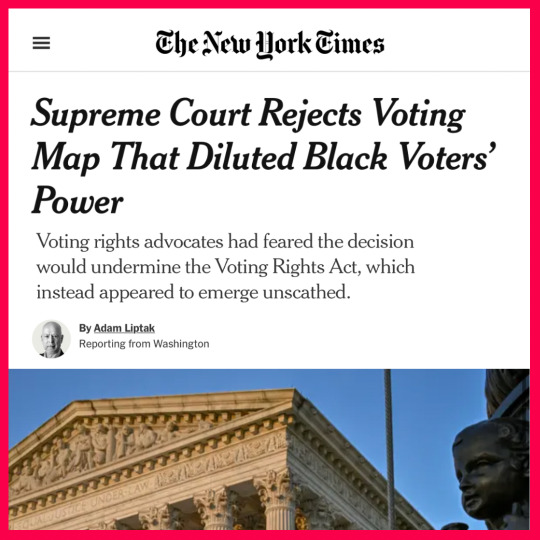
𝗕𝗥𝗘𝗔𝗞𝗜𝗡𝗚 🚨 Today, the Supreme Court ruled to protect our democracy in Allen v. Milligan.
Alabama's election map discriminated against Black voters and attempted to take away their power by unconstitutionally placing them in one district, despite the state being 27% Black.
But today's 5-4 decision ruled to uphold the Voting Rights Act and ordered Alabama officials to redraw the state's congressional map to allow an additional Black majority district.
1️⃣ Register to vote.
2️⃣ Check your voter registration.
3️⃣ And text 3 friends to tell them to check their registration.
Our vote is our voice and our power.
5 notes
·
View notes
Text
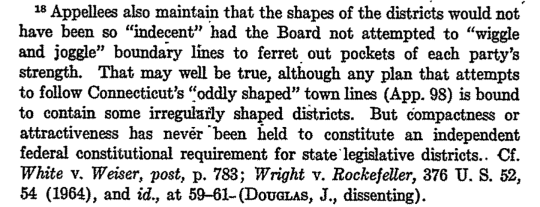
The Constitution may not require districts to be “attractive,” per Gaffney v. Cummings, 412 U.S. 735, 752 n.18 (1973), but the Court usually does.
Gomillion v. Lightfoot, 364 U.S. 339, 341, 348 (1960):
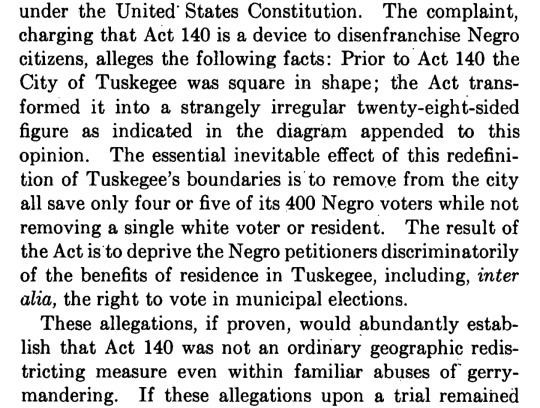

Shaw v. Reno, 509 U.S. 630, 635–36 (1993):

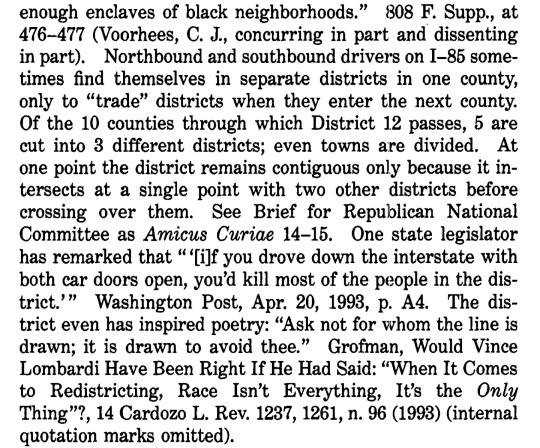
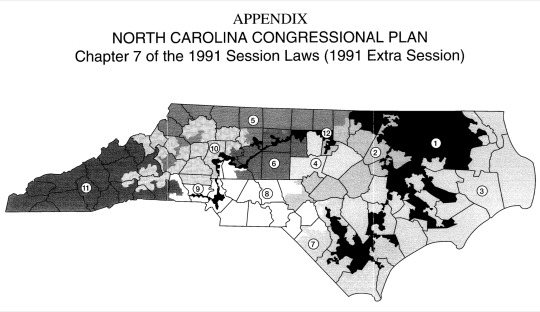
Miller v. Johnson, 515 U.S. 900, 908–09, App. B (1995):
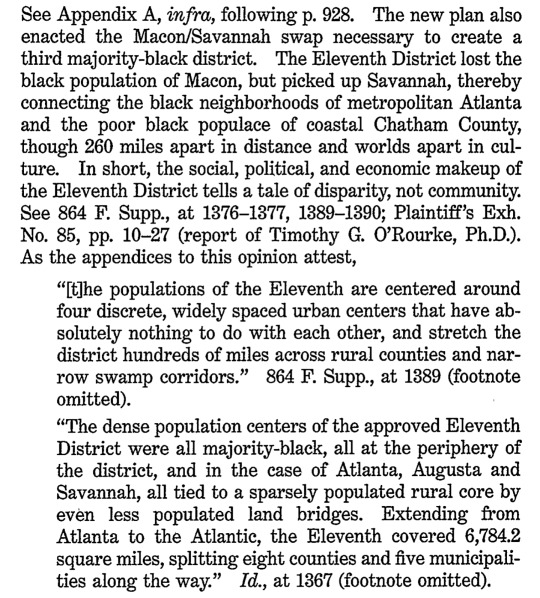

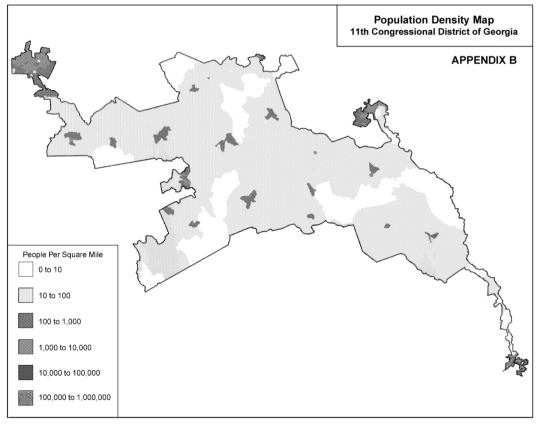
Compare Allen v. Milligan, No. 21-1086, slip op. at 44 (U.S. June 8, 2023) (Kavanaugh, J., concurring in part) (claiming that the Court has rejected any standard that would require “unusually shaped districts”):

In the Fifteenth Amendment context, at least—and cases under section 2 of the Voting Rights Act, codified as amended at 52 U.S.C. § 10301—the Court still expects your districts to look attractive.
3 notes
·
View notes